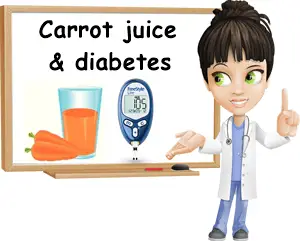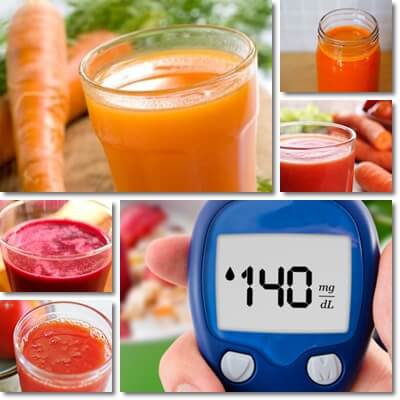No food is really prohibited in diabetes, but some are best consumed in very limited amounts and as infrequently as possible. This rule applies especially to juices, a category of food with the potential to bring significant disadvantages for diabetics. And it’s not only fruit juices, but also some vegetable juices, notably those made from sweeter vegetables such as carrots. Not surprisingly, 100 g of carrot juice provides 9-10 g of carbohydrates of which 4-5 g are simple sugars. It may not seem much, but nobody ever has as little as 100 g of anything, especially not of delicious, sweet, refreshing juice.
So carrot juice may easily end up bringing too much of a significant contribution to a diabetic patient’s intake of carbs and sugar, per day and per meal. This not only limits their intake of healthier, more satiating foods, but also holds the potential to cause undesirable fluctuations in blood sugar levels. If it becomes a regular in a diabetic diet or worse, is consumed in amounts that cannot be considered moderate, it may become a source of ill health over time and cause complications for those with the metabolic condition.

But can diabetics not drink any carrot juice at all?
This is the big question on everyone’s mind. Actually, diabetics can drink carrot juice, but in limited amounts and infrequently (definitely not everyday). The key to avoiding side effects such as fluctuations in blood sugar levels is to only have small amounts at once so you don’t exceed your recommended intake of carbohydrates per day and per meal (this intake is best determined by your doctor or a dietitian with experience in diabetic diets). It’s recommended to also avoid options with added sugars and always check the label so you know just how much carbohydrates and sugar you’re getting in a serving of the juice.
The best ways to make carrot juice better tolerated in a diabetic diet include
1) Drink small amounts at a time. This may mean as little as 100-150 ml of the juice for some diabetics.
2) No more than one serving a day.
3) Definitely not everyday.
Drinking carrot juice everyday is bad for you if you have diabetes because it raises blood sugar levels which contributes to tissue damage and related complications over time, including nerve damage, loss of vision, poor healing wounds, also weight gain.
4) Never on an empty stomach. Always after a meal.
5) Best after a light protein, low carbohydrate meal. If you’ve had too many carbs, skip the juice.
6) Pair with a source of protein or a little fat. It helps reduce the rate of sugar absorption into the bloodstream. Consider chicken, fish, a bit of cheese, eggs.
7) Choose options with no added sugars or, even better, make it yourself at home.
8) Count your carbohydrates. It helps you monitor your intake and prevent excesses.
9) Exercise afterwards. It helps improve blood sugar and prevents weight gain.

Is carrot juice good for you if you have diabetes?
No food is universally good for you, or bad. Most foods have the potential to provide both benefits and side effects. In the case of carrot juice and diabetes, health effects are largely determined by how much or how little of the juice you have, how frequently or how infrequently you have it and, lastly, the severity of your condition which determines your tolerance to carbohydrates in food (sugar included) and dictates your intake. These factors determine whether or not a diabetic can drink carrot juice in the first place and how much of it they can have safely.
What are the health benefits of drinking carrot juice for diabetes?
Assuming you may have some to begin with and keep your intake limited to small amounts consumed infrequently, benefits aimed at diabetes include a certain level of protection against diabetes-associated nerve damage, eye damage, skin benefits, blood pressure and cholesterol-lowering properties, anti-inflammatory effects and a tonic, energizing action.
1) Benefits for diabetes-associated nerve damage (neuropathy) thanks to a generous content of B vitamins, notably vitamins B1, B2, B3, B5, B6 and B9. Exact vitamin content depends on the carrot – juicier carrots will yield more juice which helps release more of the water soluble B group vitamins. 450 g of carrots will get you an estimated 230 ml of juice, assuming you are using a good juicer. And this may mean double the vitamin content in whole carrots (from 10% to 20% of the recommended daily intake of B vitamins for an average adult).
2) Good for eyesight. All orange and yellow carrots are rich in beta-carotene, alpha-carotene, lutein and zeaxanthin, precursors of vitamin A. Basically, these yellow and orange pigmented antioxidants are converted into active vitamin A which helps improve vision acuity, color and night vision whilst reducing oxidative damage. Together with B vitamins for nerve health, a sufficient intake of vitamin A may help with diabetes-associated vision loss. It helps to consume some fat to help with carotene absorption (that’s likely why some people have carrot juice with whole milk).
3) Good for the skin and wound healing. Vitamin A obtained from antioxidant carotenes plays a crucial part in cell growth and differentiation, including epithelial cells, in addition to having anti-inflammatory activity, properties which favor wound healing and promote skin regeneration. Other carrot juice benefits for skin derive from vitamins C and E, B vitamins and zinc, all of which contribute towards the same effects.
4) Minor benefits for blood pressure and cholesterol-lowering effects. The juice contains good amounts of magnesium and potassium which combat hypertension and the effects of excess sodium. And although there is little to no fiber (since the pulp is mostly left out), the antioxidant carotenes and vitamin C in the juice hold modest cholesterol-lowering properties.
5) Tonic, energizing action. The carbohydrates (sugar included), B vitamins and minerals it contains have a tonic, energizing action which supports an active lifestyle and feelings of wellbeing. Carrot juice is a good source of iron which improves blood oxygenation, boosts muscle strength and has a revitalizing effect.
What about side effects?
But if intake is excessive or too frequent (such as everyday), carrot juice can become bad for you if you have diabetes. Depending on intake and current health status, side effects may include: (short term) rise in blood sugar, feelings of unwell, lethargy, lack of energy, (long term) weight gain, tissue damage and related complications ranging from nerve damage, loss of vision, kidney damage, cardiovascular disease, weight gain etc.
1) High blood sugar levels. Don’t think for a second carrot juice doesn’t raise blood sugar levels, because it does. Even though it’s a vegetable, it has plenty of carbohydrates (9-10 g for every 100 g), almost half of which are simple sugars (4-5 g) and little to no fiber, depending on how it’s prepared. Because it lacks fiber, it also has a high glycemic index which means it has the potential to raise blood sugar levels quickly. The more you have, the higher the rise and the more likely the side effects.
2) Feelings of unwell. Causes by spikes in blood sugar levels. Effects are more pregnant the more juice you have at once. Likely worsened by consuming the juice separate from other foods, adding sugar to sweeten it or fruit juices. The drop in blood sugar that follows (hypoglycemia) soon after can lead to tiredness, fatigue, lethargy and apathy and undermine efforts to be physically active and healthy.
3) Weight gain. An excessive intake brings too high a carbohydrate and sugar content. And unless the carbs and sugar are exercises regularly, they will become fat deposits over time. This is to be avoided because excess body fat is not only a leading cause of diabetes type 2, but also a source of complications in both type 1 and type 2 diabetes.
